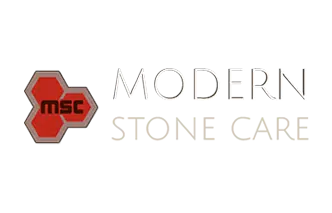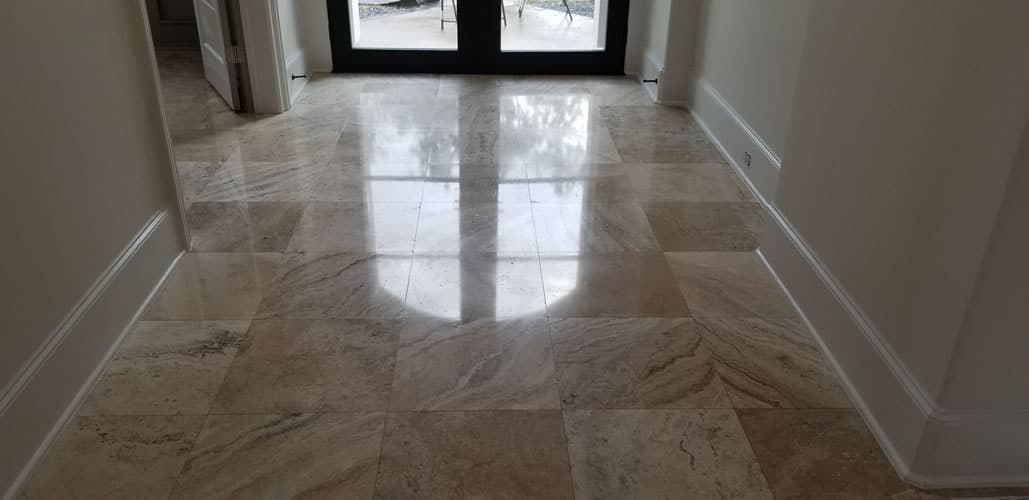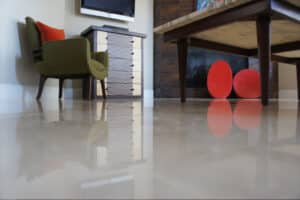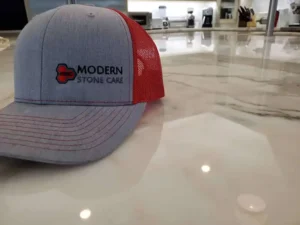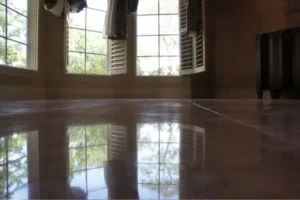Stone floors are a luxurious and timeless addition to any home. They exude elegance and sophistication while providing durability that can last a lifetime with proper care. One critical aspect of maintaining the beauty and longevity of your stone floors is sealing. Stone floor sealing not only enhances the appearance of your surfaces but also protects them from stains, moisture, and wear. But how do you know when it’s time to reseal your stone floors? In this guide, we’ll explore the tests to identify if your seal is still strong, how frequently you need to seal stone surfaces, and the factors that can lead to a seal wearing out faster.
Testing the Strength of Your Stone Floor Seal
Checking the condition of your stone floor seal is crucial to ensure its effectiveness. There are several simple tests you can perform to determine if your seal is still strong:
Water Droplet Test
Gather your materials: You’ll need a small, clean container of water and a timer.
Choose a test area: Select an inconspicuous spot on your stone floor to conduct the test.
Apply water droplets: Carefully pour a few drops of water onto the chosen area.
Observe the reaction: Watch how the water interacts with the stone. If the water forms small beads that stay on the surface and do not absorb into the stone for at least 10 minutes, your seal is still effective. However, if the water is absorbed or leaves a dark spot on the stone, it’s time to reseal.
Oil Test
Prepare the materials: You’ll need a small amount of cooking oil, a timer, and a clean cloth.
Choose a test area: Again, select an inconspicuous spot on your stone floor.
Apply the oil: Dab a small amount of cooking oil onto the stone.
Monitor the reaction: Set a timer for 15 minutes and observe how the oil interacts with the stone. If the oil is absorbed, leaving a dark or stained area, your seal is no longer effective.
Etching Test
Gather the materials: You’ll need a few drops of lemon juice or vinegar and a timer.
Select the test area: Choose a discreet spot on your stone floor.
Apply the acidic solution: Place a few drops of lemon juice or vinegar on the stone.
Watch for etching: Set a timer for 5 minutes and observe how the stone reacts. If you notice any dulling, pitting, or marks on the stone, your seal may be compromised.
Frequency of Stone Floor Sealing
The frequency at which you need to reseal your stone floors depends on several factors, including the type of stone and the level of foot traffic in your home. In general, here are some guidelines:
Natural Stone Type: Different types of natural stone, such as marble, granite, limestone, travertine, and slate, have varying porosities and susceptibility to wear. Some may need sealing every 1 to 3 years, while others can go longer between sealings.
Traffic Levels: High-traffic areas like kitchens and hallways may require more frequent resealing than low-traffic areas like bedrooms.
Exposure to Moisture: Stone surfaces in bathrooms or outdoor areas may need more frequent sealing due to exposure to moisture.
Maintenance and Cleaning: Proper maintenance, including regular cleaning and using pH-balanced stone cleaners, can extend the lifespan of your seal. Neglecting maintenance can lead to more frequent resealing.
Testing: Regularly conduct the water droplet, oil, and etching tests mentioned earlier to assess the condition of your seal. If you notice any signs of wear or a compromised seal, it’s time to reseal.
Factors Leading to Faster Seal Wear
Several factors can contribute to a stone floor seal wearing out faster than expected. Understanding these factors can help you take proactive steps to preserve your stone surfaces:
- Heavy Foot Traffic:
High foot traffic areas are more prone to wear and tear. Regularly reseal these areas to protect the stone from scratches, scuffs, and stains.
- Harsh Cleaners:
Using abrasive or acidic cleaners can erode the sealant over time. Always use pH-neutral stone cleaners to preserve your seal.
- Moisture and Spills:
Stone floors in areas exposed to moisture, such as kitchens and bathrooms, are at higher risk of seal deterioration. Wipe up spills promptly to prevent staining.
- UV Exposure:
Direct sunlight can cause sealants to break down. Consider using curtains or blinds to protect your stone floors from prolonged UV exposure.
- Inadequate Maintenance:
Neglecting regular cleaning and maintenance can lead to dirt and debris scratching the surface of your stone floors, wearing down the sealant.
Recognizing when your stone floors need to be resealed is essential for maintaining their beauty and protecting them from damage. Regularly perform the water droplet, oil, and etching tests to assess the condition of your seal. The frequency of resealing depends on various factors, including stone type, traffic levels, and exposure to moisture. Finally, be mindful of factors that can accelerate seal wear, and take proactive measures to preserve the integrity of your stone surfaces. With proper care and timely resealing, your stone floors can continue to shine and impress for years to come.
Safe Natural Stone Floor Cleaner
An integral component of our offerings is the Modern Stone Care Stone & Tile Floor Cleaner – a marvel of neutral (pH 7) marble-safe formulation designed for regular maintenance of all hard surfaces not susceptible to water harm. Its original purpose was to safeguard calcite-based stones, such as marble, limestone, and travertine, from the corrosive effects of chemical etching. The no-rinse, streak-free attributes of this cleaner render it ideal for a broad spectrum of hard surfaces, as it leaves behind neither a dulling film nor residue. By harnessing the potency of special organic salts, this formula acts as a natural moisturizer, preventing the dreaded ‘drying out’ of natural stone. Furthermore, its incorporation of optical brighteners enhances the surface’s overall appearance, accentuating its innate brilliance.
Should any queries or concerns arise about the application of this cleaning product, our attentive customer service representatives are at your disposal. They are more than willing to provide insight into the ingredients and instructions pertinent to the use of this natural stone-safe cleaner.
Natural Stone Cleaning in Houston TX
The realm of natural stone care finds its epitome in Modern Stone Care, where our highly knowledgeable technicians specialize in the meticulous restoration, cleaning, polishing, and sealing of all-natural stone surfaces. This comprehensive domain spans diverse areas, including but not limited to flooring, countertops, and even outdoor pool coping. Our unwavering commitment revolves around the preservation of your natural stone’s allure, ensuring it continues to exude the resplendence of its origins. Entrust the delicate art of natural stone care to the adept professionals at Modern Stone Care, who stand poised to offer the pinnacle of stone care services in Houston and its surrounding areas.
Modern Stone Care
970 Bunker Hill Rd
Houston, TX 77024
(832) 814–2041
View our Google Business Listing
View our Facebook Page
